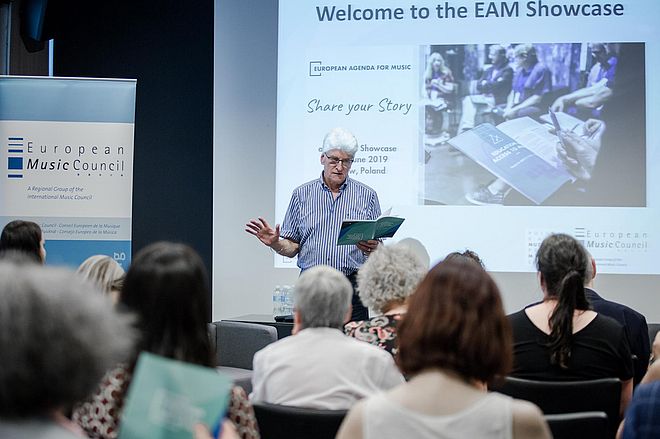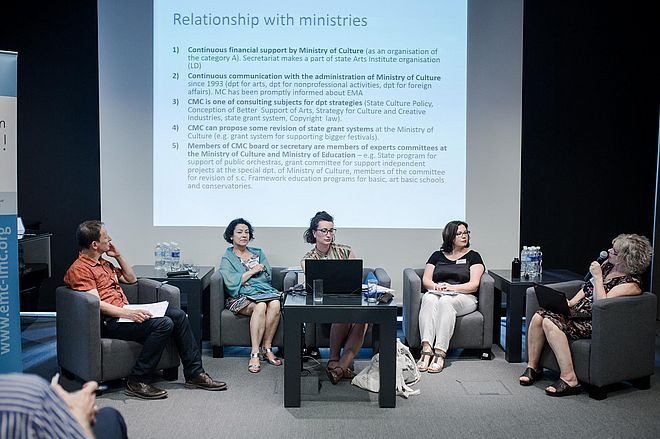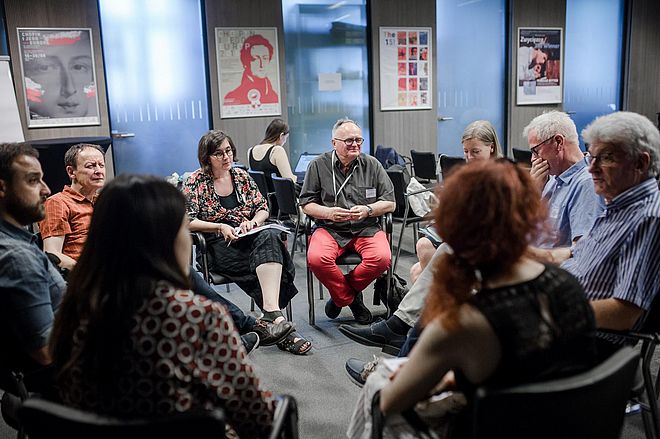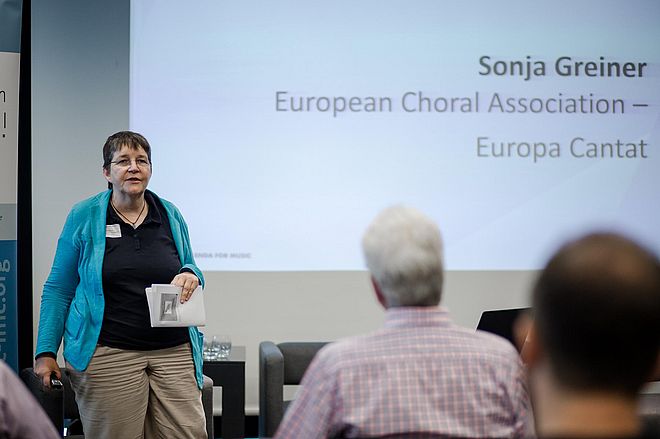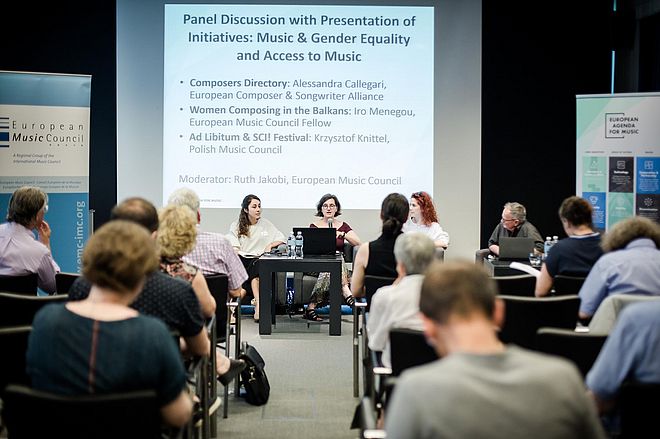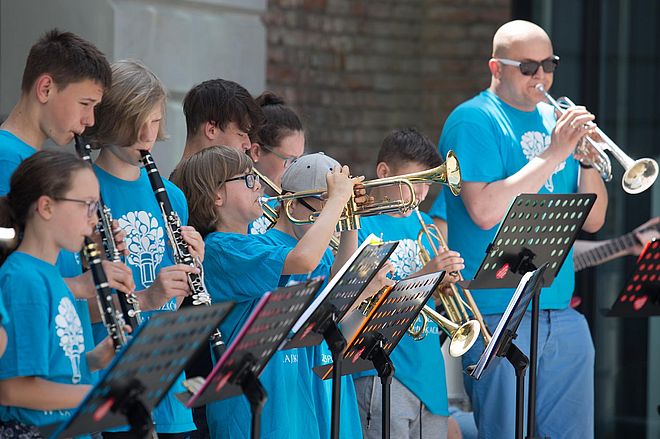Documentation EAM Showcase
These two days have been extraordinarily rich, while this cannot be an exhaustive overview, we will share some highlights and take aways from the EAM Showcase in Warsaw. This summary will give you an insight into the discussions we had in Warsaw but of course it can never replace the real life experience.
EAM Showcase Opening
EMC President Ian Smith welcomed all participants to the conference and thanked the hosts of the Polish Music Council and the Fryderyk Chopin Institute for their hospitality and cooperation. He congratulated the Polish Music Council on the newly published Polish edition of the European Agenda for Music. Grzegorz Michalski, President of the Polish Music Council, stressed the importance of music education in his keynote address, especially in Poland where music had been marginalised for decades. He pointed to the European Agenda for Music as an important step for international collaboration on the issue and outlined the ambition of the Polish Music Council to achieve more and better music education in schools in Poland.
The EAM at national level
How do you use the European Agenda for Music for your work on national level? How is the EAM connected to your work on national level? Those were the questions at the centre of the first panel discussion. In her introduction, Audrey Guerre – EMC Board Member and Coordinator of Live DMA – described how Live DMA use survey among the member organisations for their advocacy work referencing the key theme “data collection & analysis”.
Presentation of Audrey Guerre, Live DMA
Ruta Kanteruka from the Latvian Music Council and Lenka Dohnalová from the Czech Music Council presented how they have implemented the EAM into their work. In Latvia, the EAM was used as a guiding document and it “helped us – or the issues we promote – to be taken more seriously”, Ruta Kanteruka explained. Many of the advocacy activities revolved around music education in schools when the EAM was used to convince policy makers to not cut music in primary schools for at least another three years.
In the Czech Republic, the EAM was used by the Czech Music Council to influence the Strategy for Culture and Creative Industries. The EAM was also a source of inspiration, as Lenka Dohnalová explained, since the theme “shaping society” had not been used much before the EAM.
Both demonstrated that the priorities and measures of the EAM reflect many of the activities undertaken by the Latvian and Czech Music Council.
Take aways from this session:
- Use the EAM as a reference for policy and advocacy
- Disseminate the EAM to music sector stakeholders, policy makers and other partners as door opener and conversation starter
- Use the EAM a as source of inspiration for new topics
Presentation of Ruta Kanteruka, Latvian Music Council
Presentation of Lenka Dohnalová, Czech Music Council
The second part of the panel, focused on the translations of the EAM. The Polish edition of the EAM brochure was published in time for the EAM Showcase. Joanna Grotkowska from the Polish Music Council shared her experience of the translation process. Making the EAM more accessible and clarifying the meaning were the main motivations for the Polish Music Council to translate the EAM. A professional translator who is also a music journalist translated the text which was further worked on with the board of the Polish Music Council. Challenges in finding the fitting terminology when translating the EAM was also described by Stef Coninx and Stéphane Groslaude who worked on the Dutch/Flemish and French translations. In these two cases, at least two EMC member organisations worked together on the translation. Stef Coninx emphasised that the process of the translation was not only about putting it into another language but also about a better understanding what is behind the words used in the EAM, e.g. what the meaning of access to music is.
Having the translations available will be a huge benefit in disseminating the EAM to policy makers and music sector stakeholders on national, regional and local level. Jointly working on the translation can also be a conversation starter about certain issues, challenges or topics for the music sector.
Interactive sessions day 1
In three parallel interactive sessions, the participants debated the questions “How do we promote/raise awareness of the social, societal and economic impact of music?” as well as “How do we measure the social, societal & economic impact of music?”. In informal discussions, the participants exchanged experiences and collected ideas for their own work. The following documents provide a short summary of the issues discussed in the three groups:
Group 1 (with Stef Coninx and Ruth Jakobi)
Group 2 (with David Zsoldos and Simone Dudt)
Group 3 (with Sonja Greiner and Katharina Weinert)
Interactive sessions day 2
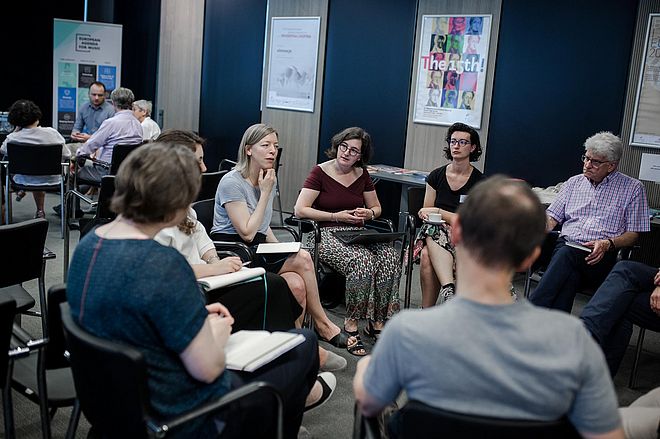
In three parallel groups, participants discussed the questions “How do we ensure music education in schools?” and “How can diversity in programme (and funding) selection be secured?” In informal discussions, the participants exchanged experiences and collected ideas for their own work. The following documents provide a short summary of the issues discussed in the three groups:
Group 1 (with Eirik Birkeland and Simone Dudt)
Group 2 (with Timo Klemettinen and Katharina Weinert)
Group 3 (with Victoria Liedbergius and Ruth Jakobi)
EAM for your own strategy
Sonja Greiner, Secretary General of the European Choral Association – Europa Cantat talked about how the organisation has used the EAM for their Singtank strategy. A Singtank is a think-tank for the development of a sustainable vision for the sector of Collective Singing for the years beyond 2020. Key themes, priorities and suggested measures from the EAM were adapted for the strategy according to their relevance for collective singing.
Presentation of Sonja Greiner, European Choral Association – Europa Cantat
Presentation of initiatives: Music & Gender Equality and Access to Music
The three projects presented during the panel focused on gender equality and access to music. All of the projects have been created without any direct link to the EAM but they promote similar themes as the EAM. This demonstrates in which ways the EAM is relevant to the music sector and how projects contribute to implement the priorities set in the EAM – even without any direct link. Alessandra Callegari of the European Composer and Songwriter Alliance (ECSA) presented the Composers’ Directory and its relation to many of EAM key themes, such as recognition, dissemination and access to music. EMC Fellow Iro Menegou talked about the project “Women Composing in the Balkans” which relates to the key themes diversity, cooperation & partnership as well as access to music. The Ad Libitum Festival presented by Krzysztof Knittel of the Polish Music Council has links to the EAM key themes diversity, recognition and access to music.
A short description of the projects and the presentations and be found here.
For the closing of the Showcase, the participants enjoyed a performance by the No Name Orchestra - Stanislaw Moniuszko Primary School of Lajski official music group. They are part of the #LetsPlayAtSchool initiative which was introduced by Adam Switala for the Polish Music Council.
Photographer: Simona Supino







